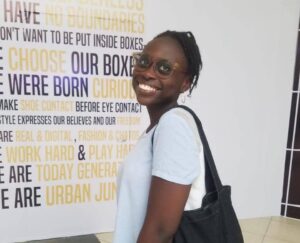CRITICAL THINKING (Titilola Awosika)

Titilola Awosika
University of Lagos
400 level
The Power of Critical Thinking: A Reflection on the Aiyeku Foundation Scholarship
It is more important than ever to be able to think critically in a world that is becoming more complex and changing quickly. Making educated decisions, navigating the obstacles of contemporary society, and achieving personal objectives are all made possible by critical thinking.
As a recipient of the Aiyeku Foundation scholarship, I’ve learnt about the advantages of the grant for myself as well as its wider social ramifications. In this essay, I will methodically assess how the scholarship has affected my life and discuss how Dr. Iyiola Aiyeku and Chief Mrs. Janet Aiyeku’s generosity is nurturing a new generation of critical thinkers who will likely lead our society in the future.
Critical thinking is the ability to think clearly and rationally about what to do or what to believe. It involves analyzing information, evaluating evidence, and drawing reasoned conclusions, free from bias or emotional influence. Critical thinking is not just about being critical or negative; it’s a disciplined process of actively and skillfully conceptualizing, applying, analyzing, synthesizing, and evaluating information gathered from observation, experience, reflection, reasoning, or communication.
Here are some historical and scholarly perspectives on critical thinking;
Socrates is often considered the father of critical thinking, and introduced the method of questioning commonly known as the Socratic Method, which encourages deep thinking and continual questioning to reveal underlying assumptions and biases. He believed that through systematic questioning, one could expose the weaknesses in an argument and arrive at a more accurate understanding of the truth.
Similarly, John Dewey offers a more modern interpretation of critical thinking, derived from the American philosopher and educator John Dewey.
He describes critical thinking as reflection, or “the active, persistent, and careful examination of a belief or assumed form of knowledge in light of the grounds that support it and the subsequent conclusions to which it leads.
” He emphasizes that critical thinking is essential for personal growth and democracy because it allows individuals to make informed decisions rather than being guided by unexamined ideas or beliefs.
In the 21st century, critical thinking is more crucial than ever due to the overwhelming amount of information available and the rapid pace of change in society. With the rise of the internet and social media, information is more accessible, but not all of it is accurate or trustworthy. Critical thinking enables individuals to sift through information, identify credible sources, and make decisions based on facts rather than misinformation or propaganda.
To make a decision, critical thinking requires analysing and evaluating a problem objectively. It is a skill that enables people to evaluate circumstances, identify prejudices, and come to logical conclusions. When analysing the value of critical thinking, the words of Marcus Cicero—a Roman statesman, lawyer, scholar, and writer—resonate profoundly. It was reportedly said by Cicero, “The safety of the people shall be the highest law.” This principle emphasises how important it is to make mindful decisions, especially when other people’s wellbeing is involved.
When it comes to the Aiyeku Foundation scholarship, recipients like myself approach our schooling and future careers with a critical eye. In addition to offering financial support, the scholarship has pushed us to reflect carefully on our roles as scholars and potential leaders. It has taught us that justice, integrity, and the greater good must be the guiding principles of our decisions and actions.
The Aiyeku Foundation scholarship has had a profound impact on my educational journey. First and foremost, it has alleviated the financial burden associated with higher education. Despite losing my father, this has allowed me to focus more intently on my studies, leading to improved academic performance and the ability to engage in extracurricular activities that further develop my skills and interests.
Beyond the financial relief, the scholarship has also provided a sense of validation and encouragement. Knowing that esteemed philanthropists like Dr. Iyiola Aiyeku and Chief Mrs. Janet Aiyeku believe in my potential has boosted my confidence and motivated me to strive for excellence as a medical student. This support has been instrumental in helping me to develop a critical mind-set, as it has encouraged me to approach life challenges with determination and a problem-solving attitude.
Even while receiving the scholarship has major personal advantages, the Aiyeku Foundation’s efforts have a huge social impact. The Foundation is assisting in the creation of a more knowledgeable and critically engaged citizenry by funding youth education. This in turn has significant ramifications for our society’s future.
An effective weapon for societal transformation is education. It gives people the information and abilities needed to deal with today’s urgent problems, such as environmental sustainability, social inequity and inclusion. The Aiyeku Foundation scholarship is an investment in our communities’ and our country’s future, not simply in individual students.
Philanthropy, as demonstrated by Dr. Iyiola Aiyeku and Chief Mrs. Janet Aiyeku, plays a crucial role in bridging the gap between those who have access to educational opportunities and those who do not. By providing scholarships to deserving students, they are levelling the playing field and giving future leaders the chance to succeed regardless of their socio-economic background. This act of generosity is a testament to their commitment to social justice and the belief that education is a fundamental right for all.
Cicero’s ideals of justice, duty, and the common good are as relevant today as they were in 43 BC. The Aiyeku Foundation embodies these principles by ensuring that talented students have the resources they need to pursue their educational goals. In doing so, they are helping to create a society where decisions are made based on reason and empathy, rather than ignorance and prejudice.
The Foundation’s work also highlights the importance of critical thinking in philanthropy. Effective philanthropy requires a deep understanding of the issues at hand, the ability to analyze the root causes of problems, and the foresight to implement sustainable solutions. The Aiyeku Foundation’s approach to scholarship demonstrates a commitment to these principles, as they not only provide financial support but also foster the intellectual and personal growth of their beneficiaries.
In conclusion, the Aiyeku Foundation scholarship has been a transformative experience, both personally and academically. It has provided the resources necessary for my success and instilled in me the values of critical thinking, social responsibility, and leadership.
The generosity of Dr. Iyiola Aiyeku and Chief Mrs. Janet Aiyeku extends beyond financial aid; it is a beacon of hope for future generations, inspiring us to think critically and act with integrity in all our endeavors and with others. This act has also spurred me to having a foundation that caters to the educational needs of deserving children in the nearest future.
As a beneficiary of this scholarship, I am not only a recipient of an award but also a steward of the ideals that Cicero championed—justice, duty, and the common good. I have a responsibility to use my education to contribute positively to society and to continue the legacy of philanthropy that the Aiyeku Foundation so beautifully exemplifies.


Comments (0)